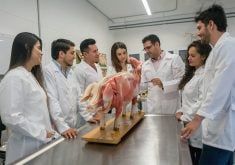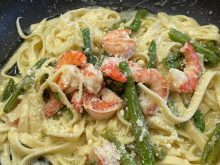THE BATTLEFORDS, Sask. – Sporting a cowboy belt buckle and boots, Greg Melchior arrives at the ice rink to teach his figure skaters the waltz.
His wife Jacqueline is amused by the blend of cowboy and coach, the mix of calves and Canasta Tango.
“It’s a nice contrast,” she smiled.
Off-farm work, which includes her own as a practical licensed nurse, has helped the Melchiors sustain a 40 head herd of purebred Speckle Parks in west-central Saskatchewan for a decade.
“It seems to take more off-farm hours to accomplish farm things,” said Greg.
Read Also

Fuel rebate rule change will affect taxes and AgriStability
The federal government recently announced updates to the fuel rebates that farmers have been receiving since 2019-20.
The Melchiors raise their cow-calf herd on seven quarters of land, three of which are rented. They keep on top of their expenses, building their home themselves with a carpenter brother, using older model seed drills and fabricating their own bale mover for the all-terrain vehicle.
They raise their animals with few inputs, using a home remedy of baking soda, ginger and water to treat scours in their calves.
Everyone pitches in to help at calving and busy times, including their teenaged children Josh and Tessa.
This frosty winter day, Josh uses a quad to haul bales to the distinctively patterned black and white breed in the rolling, treed hills behind the family home.
The Melchior operation revolves around these animals. The family grows rye for spring grazing, then moves the cattle onto native grass. The cattle are switched to higher ground after calving in March.
The cattle graze in 40 acres of standing corn in the fall to extend the summer feeding season, with an electric fence moved periodically to guide them through the crop.
Greg figures that has saved them one bale per cow. Each one now eats about three round bales in the winter.
Western art is abundant in the Melchior home. He grew up riding horses as the son of a community pasture manager but now prefer quads to horses.
“I look at horses as hay burners,” he said. “When you’re growing a farm, you’re always looking at cost. You got to watch what you do.”
Greg is careful to preserve his grazing resource for the next season and, like his father Ed, prefers a gentle hand to manage cattle.
That includes approaching them quietly, not scaring them with herding dogs, and using a quiet weaning system that hangs from the calf’s nose and prevents it from sucking.
The Speckle Park make that possible, Greg said, noting they are docile and easy to train.
His father started a farm in the area in the 1970s, with the younger Melchior choosing the current site a short drive from the Battlefords for his family.
It was Ed who first purchased the Speckle Park from fellow breeder Christine Pike to start his herd. Greg credits his father with getting him started in producing purebreds.
Greg continues with the breed, saying their good looks are more than skin deep. They produce a high quality and good tasting meat, he said.
They calve easily and offer a few surprises every spring.
“You never know what the calves will come out like,” he said of the Speckle Parks.
Meat to bone ratios are good for the breed, even though they stand smaller than others in the corral. Through dry years and BSE crises, Greg said the family continued to take good care of the cattle.
“I never try to short the cattle. You have to make as much money off them as possible,” said Greg.
When international borders were closed, Greg slaughtered his animals and sold the meat locally. That meant transporting animals to slaughter and then shipping the cut meat back to their home freezer.
“Direct marketing is hard on the back, but we would do it again if we had to,” said Jacqueline.
In future, the couple would like to increase the herd size to 100 but concede more land and a better payback are needed first.
“Society has just taken (agriculture) for granted. Everything else has gone up and we have to make do,” Greg said.
Josh and Tessa learn the value of money by owning cattle in the herd and raising pigs for the family’s use.
Jacqueline said that helps them earn money for their favourite activities of figure skating for Tessa and downhill skiing for Josh.
“They’re doing it for themselves, not just for us,” said Jacqueline.
The Melchiors support farming as a career choice for their children but are making post-secondary education their first priority.
Greg said dealing in live commodities is a serious commitment so time away from the farm is limited to picnics and visits to a family cottage.
“Those animals have to be fed so in time you can be fed. It’s all a big circle,” said Greg.














